Top Rankings
Hawthorn Academy School District ranks among the top 20% of public school district in Utah for:
Category
Attribute
Diversity
Most diverse schools (Top 1%)
For the 2025 school year, there is 1 public middle school serving 801 students in Hawthorn Academy School District. This district's average middle testing ranking is 6/10, which is in the top 50% of public middle schools in Utah.
Public Middle School in Hawthorn Academy School District have an average math proficiency score of 38% (versus the Utah public middle school average of 36%), and reading proficiency score of 35% (versus the 42% statewide average).
Minority enrollment is 42% of the student body (majority Hispanic), which is more than the Utah public middle school average of 30% (majority Hispanic).
Overview
This School District
This State (UT)
# Schools
2 Schools
367 Schools
# Students
1,399 Students
253,746 Students
# Teachers
73 Teachers
11,762 Teachers
Student : Teacher Ratio
19:1
19:1
District Rank
Hawthorn Academy School District, which is ranked within the bottom 50% of all 153 school districts in Utah (based off of combined math and reading proficiency testing data) for the 2020-2021 school year.
Overall District Rank
#83 out of 154 school districts
(Bottom 50%)
(Bottom 50%)
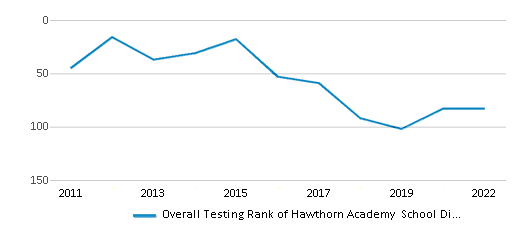
Math Test Scores (% Proficient)
(20-21)37%
39%
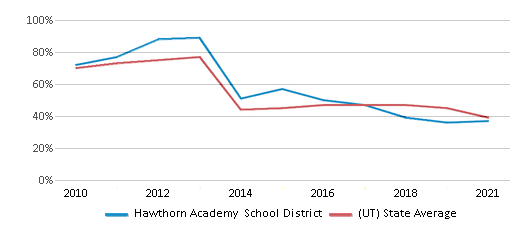
Reading/Language Arts Test Scores (% Proficient)
(20-21)35%
43%
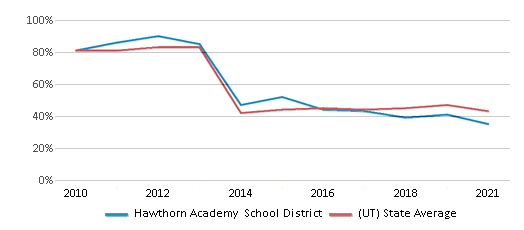
Science Test Scores (% Proficient)
(20-21)47%
45%
Students by Ethnicity:
Diversity Score
0.58
0.47
# American Indian Students
5 Students
2,504 Students
% American Indian Students
n/a
1%
# Asian Students
66 Students
4,545 Students
% Asian Students
5%
2%
# Hispanic Students
342 Students
51,305 Students
% Hispanic Students
25%
20%
# Black Students
30 Students
3,442 Students
% Black Students
2%
1%
# White Students
843 Students
178,363 Students
% White Students
60%
70%
# Hawaiian Students
34 Students
3,915 Students
% Hawaiian Students
2%
2%
# Two or more races Students
79 Students
9,598 Students
% of Two or more races Students
6%
4%
Students by Grade:
# Students in PK Grade:
-
482
# Students in K Grade:
201
6,058
# Students in 1st Grade:
156
6,391
# Students in 2nd Grade:
179
6,468
# Students in 3rd Grade:
147
6,398
# Students in 4th Grade:
160
6,415
# Students in 5th Grade:
152
7,201
# Students in 6th Grade:
121
22,231
# Students in 7th Grade:
104
52,075
# Students in 8th Grade:
100
52,556
# Students in 9th Grade:
79
40,980
# Students in 10th Grade:
-
15,392
# Students in 11th Grade:
-
15,301
# Students in 12th Grade:
-
15,798
# Ungraded Students:
-
-
District Revenue and Spending
The revenue/student of $9,242 in this school district is less than the state median of $10,732. The school district revenue/student has declined by 6% over four school years.
The school district's spending/student of $8,880 is less than the state median of $10,829. The school district spending/student has declined by 6% over four school years.
Total Revenue
$13 MM
$7,309 MM
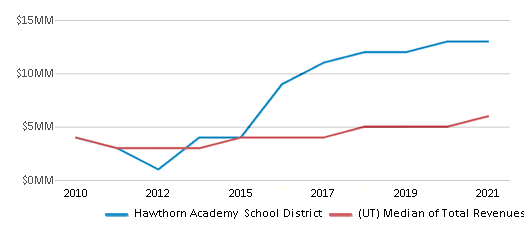
Spending
$12 MM
$7,375 MM
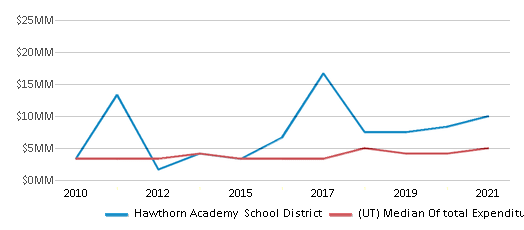
Revenue / Student
$9,242
$10,732
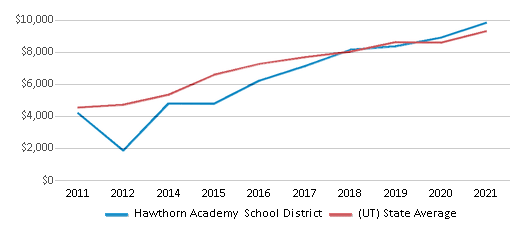
Spending / Student
$8,880
$10,829
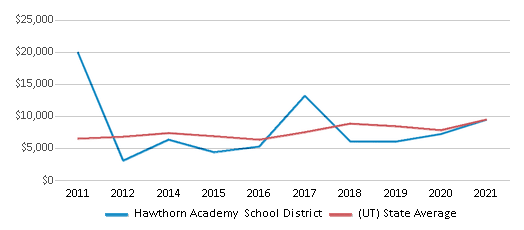
Best Hawthorn Academy School District Public Middle Schools (2025)
School
(Math and Reading Proficiency)
(Math and Reading Proficiency)
Location
Grades
Students
Rank: #11.
Hawthorn Academy West Jordan
Charter School
(Math: 38% | Reading: 35%)
Rank:
Rank:
4/
Bottom 50%10
9062 S 2200 W
West Jordan, UT 84088
(801) 282-9066
West Jordan, UT 84088
(801) 282-9066
Grades: K-9
| 801 students
Recent Articles

Year-Round Or Traditional Schedule?
Which is more appropriate for your child? A year-round attendance schedule or traditional schedule? We look at the pros and cons.

Why You Should Encourage Your Child to Join a Sports Team
Participating in team sports has a great many benefits for children, there is no doubt. In this article you will learn what those benefits are.

White Students are Now the Minority in U.S. Public Schools
Increasing birth rates among immigrant families from Asia and Central and South America, combined with lower birth rates among white families, means that for the first time in history, public school students in the United States are majority-minority. This shift in demographics poses difficulties for schools as they work to accommodate children of varying language abilities and socio-economic backgrounds.





